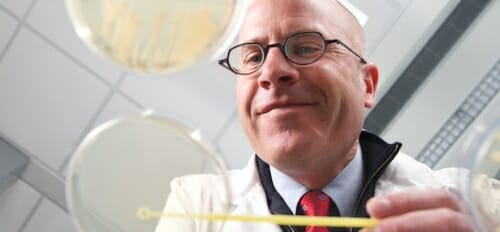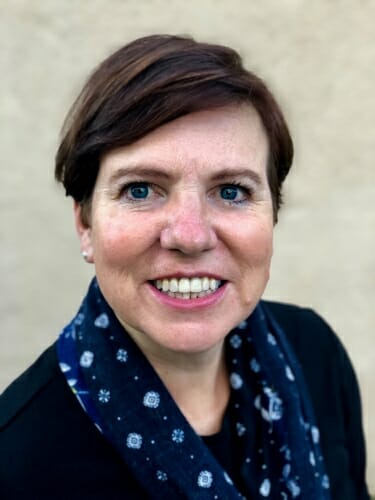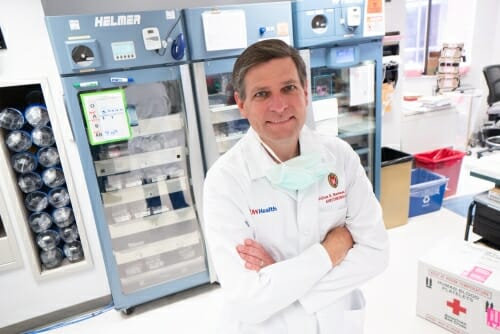UW–Madison and UW Health quickly launch a number of COVID-19 clinical trials
As the outbreak of the novel coronavirus that causes COVID-19 was deemed a pandemic, research institutions across the United States rapidly shifted focus to studies aimed at understanding the virus and finding treatments.
The University of Wisconsin School of Medicine and Public Health is among them and has responded to the demand in a big way.
Through pharmaceutical industry collaborations, partnerships with other academic and medical institutions, and its own clinical trial expertise, SMPH and its companion academic health system, UW Health, has in three months launched several clinical trials aimed at developing treatments for COVID-19 and better understanding the disease.
Among the latest clinical trials is a study conducted in partnership with the pharmaceutical company Novartis examining the potential for an existing drug called ruxolitinib to treat a serious and often deadly complication of a COVID-19 infection called cytokine storm. Locally, the study is being led by David Andes, professor of medicine in the infectious disease division at SMPH.

David Andes is conducting a study with the pharmaceutical company Novartis examining the potential for an existing drug called ruxolitinib to treat a serious and often deadly complication of a COVID-19 infection called cytokine storm. Clint Thayer, UW School of Medicine and Public Health
Cytokine storm occurs when a person’s own immune system overreacts to what it perceives as invading pathogens, such as viruses. During the normal course of an infection, the body generates blood proteins called cytokines that cause threatened cells to die to prevent the spread of the virus to other cells. However, when the body releases too many cytokines too quickly, it can result in damaged organs and be life-threatening. In the lungs, it can starve the body of oxygen.
The Novartis trial, conducted in partnership with the pharmaceutical company Incyte, is a placebo-controlled treatment study with a drug that inhibits the JAK/STAT pathway, which is a channel of communication between proteins in a cell, Andes says.
“It is thought this treatment may prevent or treat the same syndrome that is linked to multisystem organ failure in a subset of patients with COVID-19,” he says.
Working with Betsy Nugent, director of clinical trials development and accreditation/chief clinical research officer at SMPH, the UW Office of Clinical Trials and the UW Institutional Review Board, Andes and his team established a collaboration with Novartis in less than two weeks and became a site for the trial, which is currently enrolling patients. The partnership is a strong example of SMPH and UW Health’s experience working with the pharmaceutical and biotechnology industries.

Since the first COVID-19 trials were up and running, Betsy Nugent says word has spread in the clinical research arena.
“Working with Novartis was very efficient, and they were accessible for questions,” Andes says. “Everyone at UW dropped what they were doing to try and get our patients access to a potentially beneficial therapy through a clinical trial that would provide critical answers for future care of this patient population for which we still have no defined optimal therapy.”
Working at lightning speed
Another clinical trial investigating the therapeutic use of antibody-rich blood plasma from survivors of the disease began in the early weeks of the pandemic. William Hartman, SMPH professor of anesthesiology, is leading the UW–Madison and UW Health teams in partnership with 39 other research institutions. The study is investigating the potential for the plasma to lessen the severity of the disease in sick patients.
The rapid development and launch of this COVID-19 clinical trial required close collaboration between SMPH, UW Health, the UW Institute for Clinical and Translational Research and local partners, including Exact Sciences in Madison, which provides the COVID-19 tests required of all potential plasma donors, and the local office of the American Red Cross, which extracts, processes and delivers the plasma to University Hospital.
This process should have taken many months, which is typically the case for some experimental trials, but because of the strength of industry and academic partnerships and of the clinical trial infrastructure at the school and UW Health, it took less than three weeks, according to Nugent.

William Hartman is leading a team investigating the therapeutic use of antibody-rich blood plasma from survivors of COVID-19. John Maniaci, UW Health
“What typically takes a long time — for good reason — we were able to make happen at lightning speed, to address one of the most pressing medical needs of modern times,” she says. “While we may not have the volume of patients as harder hit areas of the country, this has allowed our doctors and researchers more availability to respond to the research challenge of developing new treatments.”
Researchers at UW Health and SMPH are also leading efforts to study a condition known as “COVID toes.” They hope to better understand how a surge of bruise-like blisters and bumps on the toes of children in Wisconsin and elsewhere might be linked to the pandemic. And, says study leader Lisa Arkin, a professor of dermatology and pediatrics at SMPH, they are also hoping to understand a critical immune response that may protect people from COVID-19.
A history of innovation
Clinical trials such as those at UW–Madison and UW Health continue a long tradition of investigating new and impactful treatments for serious diseases.
For instance, Mohs surgery, the “gold standard” technique for microscopic skin cancer surgery today, was developed in the 1930s by Frederic Mohs, a general surgeon at the University of Wisconsin, and later, in 1987, Folkert Belzer and James Southard revolutionized transplant surgery with organ preservation solution.
UW–Madison and UW Health have also invested in the infrastructure to support clinical trials, including the Translational Science Biocore BioBank, which is operated by the UW Carbone Cancer Center.
Combined, this history of innovation and the school’s recently increased capacity to quickly, safely and effectively start up clinical trials has led to high demand for SMPH and UW Health to take on new trials, Nugent says.
Since the first COVID-19 trials were up and running at UW Health and the School of Medicine and Public Health, word has spread in the clinical research arena, and Nugent now fields more and more requests to partner on clinical trials.
“Each week, we get new inquires, 38 so far, as of early June, in terms of potentially opening research at our institutions,” Nugent says. “We are excited to get these new opportunities.”
The ruxolitinib and blood plasma trials are two of several clinical trials underway at the school to fight COVID-19. To learn more about clinical trials, please visit: https://www.med.wisc.edu/research/#clinicaltrials.




